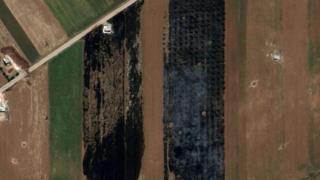Home » Middle East »
Syrian forces ‘burning crops in rebel-held north’
Satellite images show large areas of farmland in opposition-held north-west Syria have been burnt as part of what activists allege is a campaign by the government to destroy vital food crops.
Civil defence workers say incendiary weapons have been fired repeatedly at fields in Idlib, Hama and Aleppo provinces in the past month.
Air and artillery strikes have also killed at least 160 civilians.
The government stepped up attacks after accusing jihadists of breaking a truce.
The violence has also displaced 270,000 people and prompted a senior UN official to warn that a humanitarian disaster is “unfolding before our eyes”.
The region is home to an estimated three million people and there are fears that hundreds of thousands might die if the government launches a full-scale assault.
It is not fireworks. The sky is raining fire.. Regime forces repeated their shelling with rockets loaded with incendiary materials that are internationally prohibited, targeting the agricultural lands in #KhanSheikhoun area in the southern #Idlib countryside. pic.twitter.com/dEAu1wCIUQ
End of Twitter post by @SyriaCivilDef
The Syria Civil Defence – whose rescue workers are known as the White Helmets – accuses the government and its ally Russia of seeking to “burn all aspects of life” in the last region still held by the opposition after eight years of war.
In addition to bombing residential areas, it says, the Syrian and Russian militaries have targeted farmland with rockets and shells containing incendiary chemicals, causing “large pervasive fires which have destroyed all farm crops and deprived peasant farmers of their coming harvests”.
Satellite photographs taken at the start and end of last week by Maxar Technologies showed areas of scorched earth and plumes of smoke around the town of al-Habeet, in southern Idlib province, and neighbouring Kafr Nabouda, in northern Hama province.
Government forces recaptured Kafr Nabouda on Sunday, while al-Habeet is still held by opposition forces led by the jihadist alliance Hayat Tahrir al-Sham (HTS).
HTS was known as al-Nusra Front before it broke off formal ties with al-Qaeda three years ago. It is designated as a terrorist organisation by the UN.
Syria’s state news agency, Sana, reported on Wednesday that the army had targeted al-Nusra Front vehicles and “dens” in southern Idlib in retaliation for their breaches of the truce agreement brokered in September by Russia and Turkey, which backs mainstream rebel groups.
On Tuesday, a woman was killed by a rocket attack on government-held Qamhana in northern Hama, Sana said. Rockets also damaged a number of houses in the town and in Salhab, to the east, and triggered fires in farms, it added.
The Syrian Observatory for Human Rights, a UK-based monitoring group, reported that at least 15 civilians were killed in government attacks on Wednesday, and that another 21 died on Tuesday.
Seven of Wednesday’s victims were killed in an air strike on Sarja, it said.
On Tuesday, Syria’s permanent representative to the UN, Bashar al-Jaafari, told the Security Council that it was the government’s “right and duty to protect its citizens from terrorism”.
“Syria will spare no effort to rescue its citizens from the dominance of terrorist organisations in Idlib which take people as human shields and to put an end to the attacks of those terrorists on civilians in the neighbouring towns and cities,” he said.
But the UN’s Deputy Emergency Relief Co-ordinator, Ursula Mueller, warned that a further escalation in hostilities in north-western Syria would overwhelm the humanitarian community.
“There is no question today about whether you, members of this council, are aware of the tragic humanitarian situation in Syria – you clearly are,” she said.
“The question today is what you will do to protect civilians in Idlib – the latest example of an entirely known, predictable and preventable humanitarian disaster unfolding before our eyes.”
Ms Mueller said both sides appeared to have failed to respect of the principles of distinction and proportionality under international humanitarian law, noting that 22 health facilities and 25 schools had reportedly been attacked since 28 April.
Source: Read Full Article



